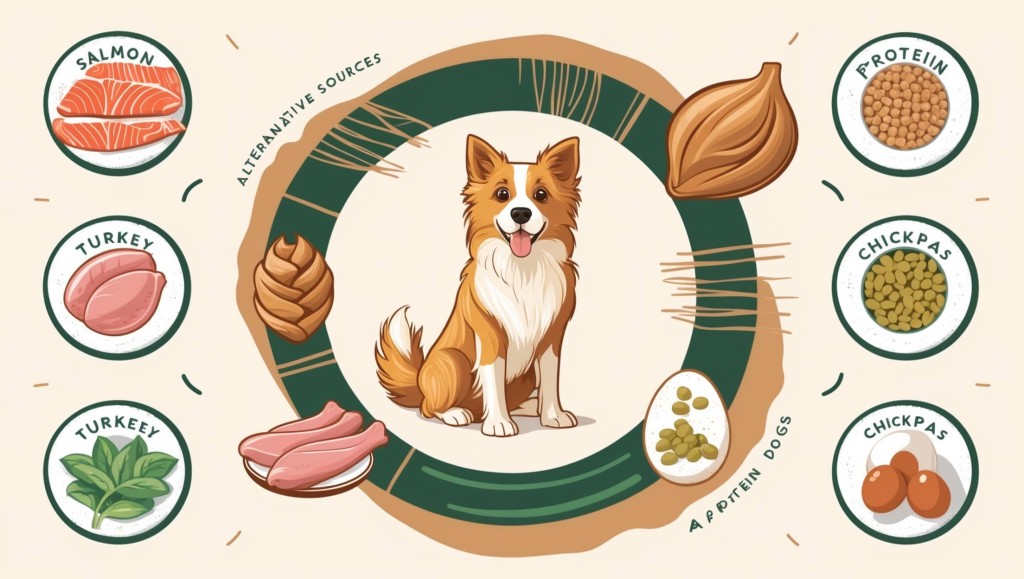Can dogs eat beef jerky? It might seem like a convenient, high-protein treat to share with your dog, but is it safe? While plain, homemade jerky can be okay in moderation, many store-bought varieties are loaded with salt, preservatives, and spices that could harm your furry friend. I learned this the hard way when I gave my pup a small piece of my store-bought jerky, only to realize afterward it contained garlic powder—something dogs should avoid.
If you’re thinking about giving beef jerky as an occasional treat, it’s essential to know what’s safe and what’s not. From hidden ingredients to ideal portion sizes, understanding these details can help you avoid unexpected health issues. In this guide, I’ll share five key facts every pet owner should know before giving beef jerky to their dog, so you can keep your pet safe and happy.
What is Beef Jerky?
Beef jerky is a dried meat product that is often seasoned and cured to enhance its flavor and shelf life. The preparation process typically involves marinating thin strips of beef in a mixture of salt, sugar, and various spices before being dehydrated or smoked. Store-bought beef jerky often contains additional ingredients like preservatives, flavor enhancers, and spices that make it less ideal for canine consumption.
Potential Risks of Beef Jerky for Dogs, Can dogs eat beef jerky
Beef jerky can pose several potential risks for dogs, especially when it’s made for human consumption.
- High Sodium Content: Human-grade beef jerky is often very high in sodium, which can be harmful to dogs. Too much sodium can lead to dehydration, vomiting, diarrhea, and even heart problems.
- Spices and Seasonings: Many beef jerky products contain spices and seasonings that can be toxic to dogs. Onions, garlic, and other common seasonings can cause gastrointestinal upset, anemia, and even damage to red blood cells.
- Artificial Sweeteners: Some beef jerky products contain artificial sweeteners like xylitol, which is extremely toxic to dogs. Even small amounts of xylitol can lead to liver failure and death.
- Choking Hazard: Beef jerky can be tough and chewy, making it a choking hazard for dogs, especially smaller breeds.
Factors Determining Beef Jerky Safety for Dogs
Several factors determine whether beef jerky is safe for dogs:
- Ingredients: The ingredients list is crucial. Look for jerky made with only natural, dog-friendly ingredients like beef, salt, and natural preservatives. Avoid jerky with added sugars, spices, and artificial sweeteners.
- Preparation Method: Avoid jerky that’s been marinated in sugary or spicy sauces, as these can be harmful to dogs.
- Dog’s Health: If your dog has any health conditions, it’s best to consult with your veterinarian before giving them any human food, including beef jerky.
- Quantity: Even if the beef jerky is safe for your dog, it’s important to give it in moderation. A small piece as a treat is fine, but too much can cause digestive upset.
Are There Any Benefits of Beef Jerky for Dogs?: Can Dogs Eat Beef Jerky

While beef jerky can be a tasty treat for dogs, it’s important to consider its potential benefits and drawbacks. One of the main advantages of beef jerky is its high protein content, which can be beneficial for dogs, especially active breeds. However, it’s crucial to choose jerky made specifically for dogs, as human jerky often contains ingredients that can be harmful to dogs.
Protein Content and Training Rewards
Beef jerky can be a great source of protein for dogs. Protein is essential for building and repairing tissues, maintaining muscle mass, and supporting overall health. For dogs, especially those who are active or have high energy levels, protein is crucial for maintaining a healthy weight and providing the energy they need for exercise and play. The high protein content of beef jerky also makes it a good choice for training rewards.
So, can dogs eat beef jerky? It depends! A little bit of jerky as a treat is usually fine, but remember, dog nutrition is important. Jerky can be high in sodium and fat, so it’s best to give it in moderation. Always check the ingredients to make sure it’s free of added onions, garlic, or artificial sweeteners, which can be toxic to dogs.
The taste and texture of beef jerky can be highly motivating for dogs, making it an effective tool for positive reinforcement during training sessions.
Nutritional Value Comparison
When comparing the nutritional value of beef jerky to other dog treats, it’s important to consider both its advantages and disadvantages. Beef jerky is typically higher in protein than many other treats, making it a more filling and satisfying option. However, it can also be higher in fat and sodium, which can be problematic for dogs with health issues or those who are prone to weight gain.
Here’s a comparison of the nutritional value of different dog treats:
| Treat | Protein (%) | Fat (%) | Sodium (mg) |
|---|---|---|---|
| Beef Jerky | 60-70 | 10-15 | 100-150 |
| Dog Biscuits | 20-30 | 5-10 | 50-100 |
| Soft Chews | 10-20 | 5-10 | 20-50 |
As you can see, beef jerky is significantly higher in protein than other dog treats, but it also has a higher fat and sodium content. This makes it important to choose beef jerky that is specifically formulated for dogs and to feed it in moderation. Always consult with your veterinarian to determine the appropriate amount of treats for your dog based on their individual needs and health status.
You might be wondering if your furry friend can enjoy a tasty treat of beef jerky. While it’s true that dogs can eat beef jerky, it’s important to be mindful of their overall dog health. Too much jerky can lead to digestive issues, so it’s best to give it in moderation as part of a balanced diet.
And always make sure the jerky is free of added seasonings, sugar, and artificial ingredients that could be harmful to your pup.
Safe Alternatives to Beef Jerky for Dogs

While beef jerky can be a tasty treat for dogs, it’s essential to remember that it’s not the only option for satisfying their cravings. There are plenty of safe and healthy alternatives that can provide your furry friend with a nutritious and delicious snack. These alternatives can be just as enjoyable for your dog, offering a variety of flavors and textures.
Safe and Healthy Alternatives to Beef Jerky
Choosing healthy alternatives to beef jerky for your dog is crucial to ensure they receive the necessary nutrients and avoid potential risks. Here are some alternatives that can be just as delicious and rewarding for your canine companion:
- Homemade Dog Treats: You can create delicious and healthy homemade treats using natural ingredients like chicken, sweet potato, peanut butter, and whole wheat flour. These treats allow you to control the ingredients and ensure they are free from artificial colors, flavors, and preservatives.
- Dehydrated Dog Treats: These treats are made by dehydrating natural ingredients like fruits, vegetables, and meat. They offer a healthy alternative to beef jerky and can be a great source of vitamins, minerals, and antioxidants.
- Freeze-Dried Dog Treats: These treats are made by freezing and drying natural ingredients, preserving their nutrients and flavor. Freeze-dried treats can be a good option for dogs with sensitive stomachs as they are often easier to digest.
- Dog-Friendly Fruits and Vegetables: Many fruits and vegetables are safe and healthy for dogs. These can include apples, bananas, blueberries, carrots, and green beans. These provide a good source of fiber, vitamins, and minerals.
- Raw Meat: Raw meat, such as chicken, beef, or turkey, can be a nutritious and natural treat for dogs. However, it’s essential to ensure the meat is sourced from a reputable supplier and handled properly to prevent contamination.
Benefits and Drawbacks of Alternatives to Beef Jerky
Here is a table that compares the different alternatives to beef jerky, including their ingredients, nutritional content, and potential benefits:
| Alternative | Ingredients | Nutritional Content | Benefits | Drawbacks |
|---|---|---|---|---|
| Homemade Dog Treats | Natural ingredients like chicken, sweet potato, peanut butter, and whole wheat flour. | Rich in protein, fiber, vitamins, and minerals. | Control over ingredients, free from artificial additives. | Requires time and effort to prepare. |
| Dehydrated Dog Treats | Natural ingredients like fruits, vegetables, and meat. | High in vitamins, minerals, and antioxidants. | Convenient and long shelf life. | May contain added sugars or preservatives. |
| Freeze-Dried Dog Treats | Natural ingredients like fruits, vegetables, and meat. | Nutrient-rich and easily digestible. | Preserves natural flavor and nutrients. | Can be more expensive than other options. |
| Dog-Friendly Fruits and Vegetables | Fresh fruits and vegetables like apples, bananas, blueberries, carrots, and green beans. | Good source of fiber, vitamins, and minerals. | Natural and low in calories. | May be less appealing to some dogs. |
| Raw Meat | Raw chicken, beef, or turkey. | High in protein, essential fatty acids, and nutrients. | Natural and highly digestible. | Requires careful handling and sourcing. |
How to Choose Dog-Friendly Jerky Treats

Finding safe and healthy jerky treats for your furry friend can be a bit of a challenge, but it doesn’t have to be overwhelming. With a little knowledge and careful selection, you can ensure your dog enjoys delicious and nutritious treats.
Ingredient List:
The ingredient list is your first line of defense. It reveals what goes into the jerky, and whether it’s truly dog-friendly. Look for simple and recognizable ingredients.
- Meat as the First Ingredient: The primary ingredient should be a specific type of meat, like beef, chicken, or turkey. This means it should be listed first, not a generic term like “meat by-products”.
- Avoid Artificial Additives: Look out for artificial colors, flavors, and preservatives. These can be harmful to your dog’s health. Natural ingredients are always a safer choice.
- No Added Sugar or Salt: These can contribute to health problems in dogs, especially if they are given in excess. Choose jerky treats that are naturally sweet or salty from the meat itself.
- Limited Fillers: Fillers like grains and other non-meat ingredients can be unnecessary and potentially contribute to allergies or digestive issues. Look for treats with minimal fillers.
Processing Methods:
The way jerky is made can impact its safety and nutritional value.
- Human-Grade Meat: This means the meat used is safe for human consumption. This is a good indicator of quality and safety.
- Air-Dried or Dehydrated: These methods preserve the meat without using harsh chemicals or preservatives. Look for jerky treats that are air-dried or dehydrated.
- No Added Nitrates or Nitrites: These preservatives can be harmful to dogs, especially in large amounts. Choose jerky treats that are naturally preserved.
Labeling and Reputable Brands:
- Read the Label Carefully: Pay attention to the ingredient list, processing method, and any warnings or special instructions. If you’re unsure about an ingredient, do some research.
- Look for Certifications: Some brands may have certifications from organizations like the American Animal Hospital Association (AAHA) or the Veterinary Oral Health Council (VOHC), indicating that the product meets certain quality and safety standards.
- Research Brands: Check online reviews and forums to see what other dog owners have to say about different jerky brands. Look for brands with a good reputation for safety and quality.
Ultimately, the decision of whether or not to give your dog beef jerky rests on you and your veterinarian. While it’s important to be aware of the potential risks, there are also safe and healthy alternatives available. By making informed choices and consulting with your vet, you can ensure your dog enjoys delicious treats without compromising their health. So, let’s explore the world of dog-friendly snacks and discover what treats are best for your furry friend!
FAQs
Is all beef jerky bad for dogs?
No, not all beef jerky is bad for dogs. Dog-friendly jerky treats are specifically formulated with safe ingredients and lower salt content.
Can I give my dog a little bit of my beef jerky?
It’s best to avoid giving your dog human-grade beef jerky due to its high salt content, artificial ingredients, and potential choking hazards.
What are the signs of a dog eating too much beef jerky?
Signs of too much beef jerky can include vomiting, diarrhea, increased thirst, and lethargy. If you notice any of these symptoms, contact your veterinarian immediately.
Can dogs eat any type of beef jerky?
Dogs should only eat beef jerky that is plain and free from added salt, spices, or preservatives. Store-bought beef jerky often contains ingredients that can be harmful to dogs.
What should I do if my dog accidentally eats store-bought beef jerky?
Monitor your dog closely for signs of sodium poisoning or other adverse reactions, such as vomiting or lethargy. Contact your veterinarian immediately if symptoms appear.
How often can I give my dog beef jerky?
Beef jerky should only be an occasional treat and should not make up more than 10% of your dog’s daily caloric intake.
What are some safe alternatives to beef jerky for dogs?
Safe alternatives include dog-specific jerky treats, homemade plain beef jerky, boiled chicken, baby carrots, apple slices (without seeds), and small pieces of banana.
Are there any specific ingredients I should avoid in beef jerky for my dog?
Yes, avoid beef jerky with added garlic, onion, excessive salt, chili powder, and artificial preservatives like BHA, BHT, and nitrates.
Can puppies eat beef jerky?
Puppies have more sensitive digestive systems, so it’s best to avoid giving them beef jerky. Opt for puppy-formulated treats that are safe and nutritious.
Kylie has been writing about dogs for over five years, focusing on the distinct traits of various dog breeds. Her blog offers straightforward advice on breed-specific care, health, and grooming, helping dog owners better care for their beloved pets.
